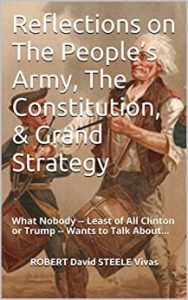
The People’s Army – the Continental Army rooted in home-spun militias – was formed and fought and won a war before the U.S. Constitution was written and signed in 1787. The Constitution – and the Republic – exist because the People’s Army, the Continental Army led by George Washington – leveraged the twin advantages of a righteous cause and home court to eject what was then the greatest imperial power on the planet. Of the 55 men attending the Constitutional Convention, at least 29 served in the Continental Army, most of them in positions of command. Understanding the relationship between the people from whom the early militias were drawn, the Army, and the Constitution, is essential to evaluating where we fall short today.
The Constitution’s Preamble provides the six purposes for the Constitution and the Republic represented by the Constitution, itself a “mission statement” and an operating manual for the United States of America:
To form a more perfect union;
To establish justice;
To insure domestic tranquility;
To provide for the common defense;
To promote the general welfare; and
To secure the blessings of liberty to ourselves and our posterity.
These are not simply purposes of the American people or its government. These were once and should again be integral missions of the United States Army, an Army intended to be Of, By, and For We the People. When this is the case – it is not today – the Army will not go to war without a Constitutional mandate from Congress; foreign countries will not be able to buy US foreign policy; and war will not be a profit center and budget buster.
“National security” has become a cancer, and false patriotism the last refuge of scoundrels whose real purpose is to loot the public treasury. The time has come for the public to demand a baseline review of how the government generally and the Army specifically is trained, equipped, and organized. There are many laws and regulations in place that are questionable if one applies the standard of service to the public interest. Army doctrine and Army practice have tended to be complacent about high crimes and misdemeanors among civilian politicians and their political appointees. One could go so far as to say that the time has come to alter the government – to alter the way the government is financed, the way the government makes decisions, and the way the government does or does not reflect the will and interests of the larger public.



